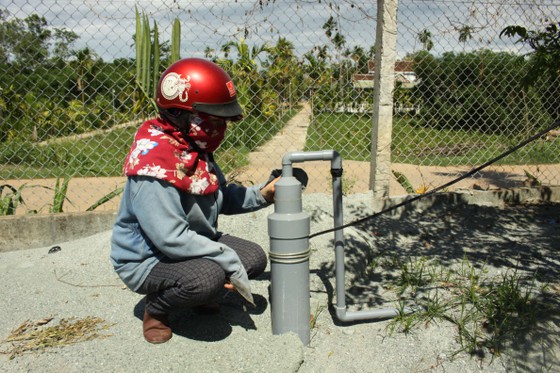Within a month, Ms. Bui Thi Nga (Huong Nhuong Bac village, Tinh Dong commune, Son Tinh district, Quang Ngai province) drilled 2 wells, each well drilled more than 100m deep. Ms. Nga said: "Among 2 wells, one well has little water, but after running the machine for about 30 minutes, it dries up immediately, the other well does not have a drop of water." In addition to 2 drilled wells, Ms. Nga has a dug well that has dried up and cannot be used.
Without water, Mrs. Nga asked for drinking water from wells. Some families still had water, stored it and used it sparingly. The garden that is growing 2 poles of corn also does not have water for irrigation, Ms. Nga said: "The garden is large, so corn should be planted, now there is no water, it must be abandoned".

Each well drilled if there is water in Huong Nhuong Bac village (Tinh Dong commune, Son Tinh district, Quang Ngai province) costs about 18-20 million, many families drill more than 100m deep but still no water.
Mr. Doan Van Trung (Huong Nhuong Bac village, Tinh Dong commune) has a well dug about 17m that has dried up. He asked for water from households drilling wells that met groundwater. Mr. Trung said: "Drilling a well is very expensive, if it meets the underground water source, it is less difficult, if it cannot find water, it also costs money, so I go to beg for water from lucky households with water sources in the village."
According to people, each well drilled with water costs 18-20 million VND, if drilling without water, he also pays oil workers from 4-5 million VND, there are people in Huong Nhuong Bac village who have drilled up to 3 pieces. wells, but there is no source of water.
Many families who are used to using well water choose to dig deeper. Ms. Nguyen Thi Khanh (Dong Nhon Bac village, Tinh Dong commune) has 2 dug wells, every time it's dry, Ms. Khanh asks someone to dig 1-2m deeper to draw some drinking water for the family.
According to statistics of Tinh Dong Commune People's Committee, the whole commune has 7 villages, a total of 1,794 households/6,709 people, the results of reviewing the situation of domestic water shortage in the commune have about 680 households. In the face of water shortage in the hot summer, many households have drilled their own wells to get water, making it difficult for the locality to manage and protect the environment and water resources.
Mr. Le Quoc Nha, Chairman of Tinh Dong Commune People's Committee said: "Currently, in the hot season, the main measure is still to use water sparingly, and to limit drilling wells. The locality has asked Son Tinh district to support the locality in building a domestic water supply system for people."
Mr. Le Van Minh, Director of the Center for Clean Water and Rural Environmental Sanitation in Quang Ngai Province said: “We are managing 20 water supply projects serving 12,500 households in the delta. All are operating continuously, providing water for people during the dry season.”
According to Mr. Minh, compared with the number of communes and districts in need of domestic water, the number of 20 water supply works is still very small. Mr. Minh said: “Locals that do not have a clean water supply system for daily life can actively drill more wells, repair damaged pumps, recommend people to use water sparingly. number of water supply projects are being implemented to serve clean water for the people”.
It is expected that in the period of 2021-2025, it is proposed to invest in building 20 clean water supply projects to supply water to 161,496 people in rural areas of Quang Ngai province.
Not only in the plains have difficulty with water sources, but also in mountainous areas in the drought season, even more difficult. Quang Ngai province has 490 water supply works that have been put into use, of which 454 are located in mountainous districts, of which 133 are currently inactive. Most of the water supply works in mountainous districts are small in scale, supplying water to ethnic minority areas without collecting water use fees. This work is managed by the Commune People's Committee, so there is no source of funding for salary payment. project management, operation and maintenance. Therefore, it is difficult to develop a safe water supply plan for these areas.